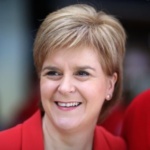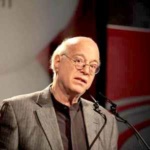This year’s Edinburgh International Culture Summit brings together internationally respected names from architecture and design, politics, arts and economics to discuss Culture and Investment, one of three strands being explored at this powerhouse of international discussion from 22 – 24 August 2018.
The overarching theme of Summit 2018 is Culture: Connecting Peoples and Places. Building on the succinct and successful format of previous editions, Summit 2018 will address three key themes; Culture and Wellbeing, Culture in a Networked World and Culture and Investment, the details of which are announced today. Each theme will be the focus of a plenary session in the Debating Chamber of the Scottish Parliament, supported both by private policy discussions and workshops.

The Summit today also announced the well-known global figures set to share special messages with the delegates at the opening session. The Rt Hon Nicola Sturgeon MSP, First Minister of Scotland will welcome the international ministers, artists and delegates sharing her insights into Scotland’s success through culture; The Rt Hon Theresa May MP, Prime Minister of Great Britain; former Governor-General of New Zealand His Excellency The Rt Hon Sir Jerry Mateparae, speaks about the contribution of Maori culture and how diversity makes for greater understanding in New Zealand; Dr Catarina Vaz Pinto, Councillor of Culture, The City of Lisbon, Portugal shares the importance of maintaining a balance between protecting historic culture and heritage and regenerating spaces and creating new art; Joshua Ramo, Vice Chairman and Co-Chief Executive, Kissinger Associates, USA urges governments to tackle their fluency in many cultures and to fully grasp the effect and opportunity of digital communication in our networked world; well-known actors Pu Cunxin, (Coriolanus EIF 2013) and Charlene Boyd (NTS The Macbeths) will perform excerpts of classic texts by Shakespeare and Li Bai in Chinese and English to demonstrate the emotional power of theatre to transcend the barriers of language.
Culture and Investment
The theme seeks to explore questions such as: How should government policy balance investment in individual artists, creative communities, and buildings? The provision of elaborate arts centres throughout the world is certainly politically attractive, but what of the art and people that brings these places to life?
At a time when difficult decisions need to be made about the allocation of resources for culture, the Summit will carefully consider the funding challenges facing policy-makers, artistic entrepreneurs and practicing artists alike. If cultural consumption and practice can happen on a street corner or an online video, what are the benefits of investing in buildings and people?
Providing a launch-point for discussions around these ideas the Culture and Investment plenary session, open to the public on application of tickets in advance, includes special messages both from philosophers and practitioners:
 Prof Richard Sennett OBE (Founder and Chair of the Advisory Committee, Theatrum Mundi), offers an historical and philosophical perspective on ways to consider cultural infrastructure – why we should consult artists when creating spaces in cities, how we can best sustain culture, and what the downfalls have been in western structures and new buildings which have proved unsustainable; Elizabeth Diller (Founder, Diller Scofidio + Renfro, USA) joins the Summit live from New York and takes a view built on years of practice as an architect looking at reusing spaces which had been abandoned in smart ways which bring culture and life to cities, drawing on examples from her own work on New York’s Highline and The Shed which opens in Spring 2019; Sanjoy Roy (Managing Director, Teamwork Arts, India) harnesses ancient monuments and ruins across India and transforming them into cultural hubs for everyone, like the Jaipur Literature Festival,; Constantin Chiriac (President, Sibiu International Theatre Festival, Romania) talks about urban regeneration and the audacity of establishing the Sibiu Theatre Festival, now the third biggest arts festival in Europe, at a time of social and economic hardship in Romania; and Dr Maria Balshaw CBE (Director, Tate Art Museums) talks about how buildings should work with their surroundings to create and regenerate cultural spaces and inspire complex urbanism and economic growth.
Prof Richard Sennett OBE (Founder and Chair of the Advisory Committee, Theatrum Mundi), offers an historical and philosophical perspective on ways to consider cultural infrastructure – why we should consult artists when creating spaces in cities, how we can best sustain culture, and what the downfalls have been in western structures and new buildings which have proved unsustainable; Elizabeth Diller (Founder, Diller Scofidio + Renfro, USA) joins the Summit live from New York and takes a view built on years of practice as an architect looking at reusing spaces which had been abandoned in smart ways which bring culture and life to cities, drawing on examples from her own work on New York’s Highline and The Shed which opens in Spring 2019; Sanjoy Roy (Managing Director, Teamwork Arts, India) harnesses ancient monuments and ruins across India and transforming them into cultural hubs for everyone, like the Jaipur Literature Festival,; Constantin Chiriac (President, Sibiu International Theatre Festival, Romania) talks about urban regeneration and the audacity of establishing the Sibiu Theatre Festival, now the third biggest arts festival in Europe, at a time of social and economic hardship in Romania; and Dr Maria Balshaw CBE (Director, Tate Art Museums) talks about how buildings should work with their surroundings to create and regenerate cultural spaces and inspire complex urbanism and economic growth.
In addition to the Culture and Investment plenary session, in the Debating Chamber of the Scottish Parliament (open to the public), three workshops for speakers and delegates only will explore shaping places, sustaining culture and planning.
Shaping Places is explored in a session where contributions from a wide range of speakers look at the importance of culture in shaping place, explore the sustainable balance of building and people, and the importance of a range of perspectives at the planning stage: Eng Ahmad Al-Maziad, Chief Executive Officer of the General Culture Authority in Saudi Arabia talks about the big investment Saudi Arabia is making in culture both to regenerate and to reach out to develop understanding; Philip Long, Director of the V&A Dundee discusses how the V&A will change Dundee and Scotland and the role of programming in sustainability; Sir David Chipperfield CBE, Founder of David Chipperfield Architects shares his work on St Andrew Square in Edinburgh and addressing and working with spaces that already exist; Dr Lucy O’Carroll the Chief Economist of Aberdeen Standard Investments urges economists, developers, and artists to work together in the planning and future proofing of cultural projects.
 Chaired by Vicky Featherstone the breakout session Empowering People: Sustaining Culture focuses on investing in people. The panel includes: Rosa Daniel, Singapore’s Deputy Secretary (Culture), Ministry of Culture, Community and Youth, and Chief Executive Officer of the National Arts Council, Singapore – who will talk about Singapore’s cultural policy over the past 25 years to raise arts excellence and grow audiences, and the Council’s focus over the next five years on long-term sustainability through technology, arts education, research, and capability development; Glen Grant from Super16 in Denmark where final year students move from making films to running the school, shares the benefits of this alternative structure and empowering youth; Leo Kellgren-Parker the Founder of LIVR, a VR app which films intimate theatre productions from a front row seat, talks about creating immersive and highly accessible opportunities to see theatre from far afield; and Lydia Koniordou the Greek Minister of Culture and an actress, speaks from her rare perspective of being both a policy maker and an artist, exploring the difference between living and writing cultural policy.
Chaired by Vicky Featherstone the breakout session Empowering People: Sustaining Culture focuses on investing in people. The panel includes: Rosa Daniel, Singapore’s Deputy Secretary (Culture), Ministry of Culture, Community and Youth, and Chief Executive Officer of the National Arts Council, Singapore – who will talk about Singapore’s cultural policy over the past 25 years to raise arts excellence and grow audiences, and the Council’s focus over the next five years on long-term sustainability through technology, arts education, research, and capability development; Glen Grant from Super16 in Denmark where final year students move from making films to running the school, shares the benefits of this alternative structure and empowering youth; Leo Kellgren-Parker the Founder of LIVR, a VR app which films intimate theatre productions from a front row seat, talks about creating immersive and highly accessible opportunities to see theatre from far afield; and Lydia Koniordou the Greek Minister of Culture and an actress, speaks from her rare perspective of being both a policy maker and an artist, exploring the difference between living and writing cultural policy.
The final workshop Cultural Infrastructure and planning for production, facilitated by Dr John Bingham-Hall FRSA, Director of Theatrum Mundi, hears from Amica Dall and Giles Smith from Assemble, Melissa Meyer from We Made That, and Justinien Tribillion, a Researcher with Theatrum Mundi and shares case studies from Stockholm, Edinburgh, Paris and London examining how artists use and produce public space.
- JAZZ REVIEW: Fergus McCreadie album launch @ Edinburgh Queen’s Hall - 9th April 2022
- JAZZ REVIEW – SNJO: Pop! Rock! Soul! @ Edinburgh Queen’s Hall - 26th February 2022
- The Fall of the American Empire (2018) - 22nd June 2019
